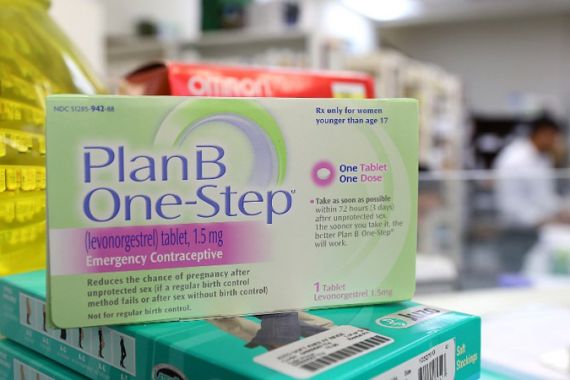US court lifts morning-after pill age limit
New York judge rules emergency contraception to be available without prescription to all girls of reproductive age.

A federal judge has ordered the US Food and Drug Administration (FDA) to make “morning-after” emergency contraception pills available without a prescription to all girls of reproductive age, reversing a decision by the Barack Obama administration.
The ruling in a Brooklyn court, New York, on Friday is the latest step in the years-long legal saga over the pill known as “Plan B”, a drug that has also sparked political and religious battles.
The order reverses a surprise December 2011 decision by US Health and Human Services Secretary Kathleen Sebelius who had barred girls under 17 from buying the pills without a prescription.
The FDA had initially decided to approve over-the-counter sales with no age limits, but Sebelius ordered it to reverse course.
Reproductive-rights groups cheered the decision as overdue, while anti-abortion and some religious groups condemned it.
Some pharmacists had refused to dispense emergency contraceptives because it violated their religious faith. Making the pills available over the counter removes the pharmacist’s role in dispensing the drug.
|
“Women all over the country will no longer face arbitrary delays.“ – Nancy Northup, president of Center for Reproductive Rights |
In a statement, the US Conference of Catholic Bishops said, “This ruling should be appealed and overturned.”
The judge in his ruling also criticised the Obama administration for interfering with the process for political purposes.
President Obama had supported restriction, invoking his daughters. But the timing, 11 months ahead of the presidential election, sparked criticism that he was trying to appease social conservatives.
In his ruling, US District Judge Edward Korman called Sebelius‘ decision “arbitrary, capricious and unreasonable”.
“The motivation for the secretary’s action was obviously political,” he wrote.
Science vs politics
Because physicians and doctors advising the FDA had concluded that the morning-after pills were safe for younger adolescents and did not cause promiscuity, critics say Sebelius‘ decision as an instance of politics trumping science – something that particularly riled activists who had been led to expect otherwise.
|
“This decision givees the FDA the chance to reclaim its ability to make decisions based on science, medicine and evidence – not politics.“ – Susan Wood, FDA veteran |
The Center for Reproductive Rights and other groups had petitioned the FDA to strike down age and access limits, saying there was no scientific proof that girls younger than 17 could not safely use the drug without supervision.
Nancy Northup, president of the center, hailed the ruling: “Women all over the country will no longer face arbitrary delays.”
In 1999, Teva Pharmaceuticals Ltd’s Plan B became the first emergency contraceptive available by prescription in the United States. The company also markets Plan B One-Step, a one-pill version of Plan B.
As of February, Plan B US sales over the past 12 months were about $79m, according to data compiled by IMS Health, which tracks pharmaceutical sales. That is relatively small by pharmaceutical industry standards.
Emergency contraceptives generally sell for $10 to $80. Although they can work as long as 120 hours after unprotected sex, they are most effective in the first 24 hours.
One FDA veteran praised the decision. “This has been a 10-year saga during which the FDA was not allowed to do its role properly, not allowed to make science-based decisions,” said Susan Wood.
Wood resigned from the FDA as assistant commissioner for women’s health in 2005 over its decision not to approve over-the-counter sales of emergency contraception. She is now director of the Jacobs Institute of Women’s Health at George Washington University in Washington.
“This decision gives the FDA the chance to reclaim its ability to make decisions based on science, medicine and evidence,” Wood said, “not politics.”
In 2005, the FDA declined to approve over-the-counter sales of the drug, over-ruling its panel of outside experts as well as its own scientists.